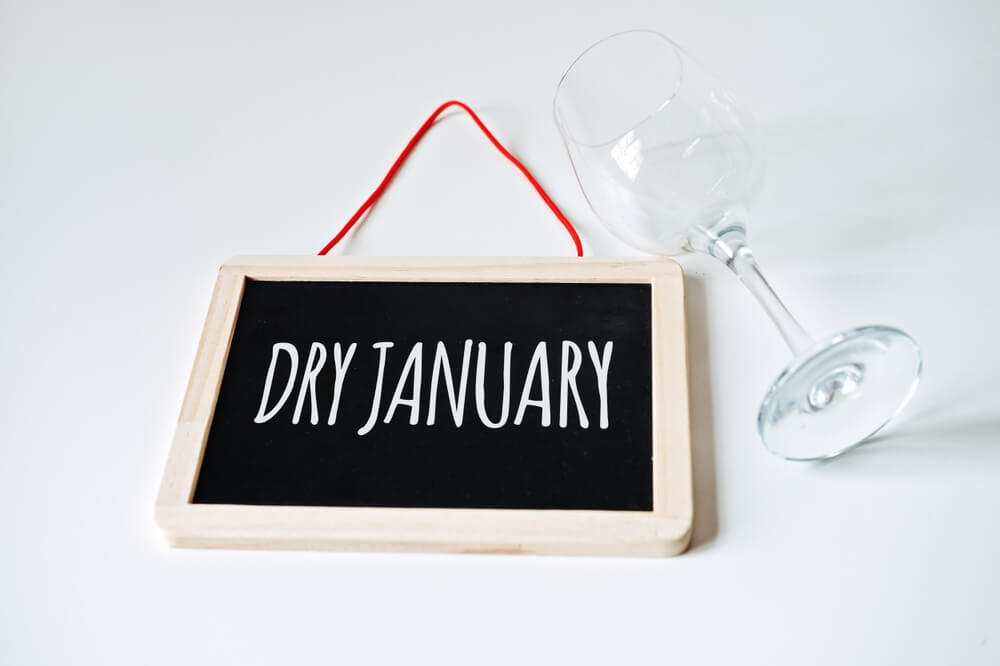6 Benefits of Dry January

What Is Dry January?
January is often the time of year in which people make new resolutions and grand gestures to make positive changes in their lives, establish and meet goals, and begin to incorporate new healthy habits into their routines. Dry January is a public health initiative that challenges participants to abstain from alcohol for the full calendar month of January. The benefits of dry January are numerous, with participants noticing huge improvements in their health and overall well-being. Just stepping back from alcohol consumption for 31 days makes a huge difference in many people’s lives.
The Dry January challenge was started in 2012 by the UK nonprofit organization Alcohol for Change UK, with only 4000 people participating. Now, a decade later, the term Dry January is known worldwide, with approximately 20% of American adults planning to participate.
Since the pandemic’s beginning in 2020, the number of Americans with alcohol use disorders has exploded, with people drinking alcohol to cope with stress, isolation, and loneliness. Whether you are using Dry January as a chance to detox your body for your health or are participating as part of a New Year’s resolution, intentionally stopping your alcohol intake will give you the opportunity to assess and take control over your drinking habits, assess your thoughts, behaviors, and emotions, and determine whether you are operating at a healthy level when it comes to alcohol.
6 Benefits of Dry January
Dry January has several benefits to your physical health, as well as your emotional, social, and spiritual well-being. Alcohol use can be detrimental to all aspects of your life, especially if it becomes a habit. You may find yourself turning to drink to escape emotional pain, or you may begin allowing your social obligations to fall by the wayside in favor of staying in to have a few drinks. Maybe your body is beginning to show signs of illness, stomach problems, or liver damage from alcohol abuse. The point is, drinking habitually and drinking to excess is not good for your body, mind, and spirit, and taking a full 31 days to enjoy the benefits of dry January may give you benefits like:
- Saving money. Drinking is expensive. All those trips to the beer store and the wine aisle add up quickly. Throwing money away on alcohol is like pouring dollars down the drain when it could be put to much better use in your life.
- Lower risks of cancer, liver disease, and other serious illnesses. Alcohol is linked to several forms of cancer including stomach, mouth, and esophageal cancer. It is also related to fatty liver disease, liver cirrhosis, brain issues, and serious digestive issues. Stopping drinking will give your body some time to rest and repair itself, lower your blood pressure and cholesterol levels, and improve your immune system.
- Looking healthier. Putting a pause on your drinking habits will give you clearer skin, eliminate undereye circles and bloodshot eyes, help you lose some weight, and reduce bloating and puffiness in the face. Drinking reduces the quality of your sleep, so when you quit, you will sleep better, giving you more energy and returning the brightness behind your eyes. You will even smell better, as your body will not need to eliminate alcohol through your sweat and breath.
- Improved mental health. We have all heard that alcohol is a depressant. It affects our brain chemistry, messes with dopamine levels, and is abused to mask unpleasant feelings like sadness, anxiety, loneliness, and other issues that should be dealt with instead of pushed down by the drink. Putting down the glass for an entire month will improve your emotional stability, your brain chemistry will have a chance to rebalance itself and you will be able to determine whether further therapy or other help is needed.
- A healthier relationship with alcohol. Stepping away from alcohol will give you a good look at how much you have been drinking. When you take a step back and evaluate what “a few” drinks look like, you may notice you have been drinking more heavily than you first thought. Heavy drinking is defined as two to three drinks per day for women and up to four per day for men, and binge drinking is four or more on one occasion for women and five or more for men on at least five occasions in the past month. So even if you “have a few” on the weekends, you may drink heavier than you thought.
- You will get to know yourself without alcohol. Once the alcohol has cleared out of your system, you will be back to square one, resetting and starting back from scratch. This way, if you decide to have a beer on February 1st, you will have a better idea of what you are like without it physically and emotionally, allowing you to reevaluate the pros and cons of drinking.
Learn why you should quit drinking before Dry January in our blog below:
7 Tips for a Successful Dry January
The benefits of dry January participation are numerous, but if you are worried you may not make it the full 31 days, here are some tips to stay sober:
- Make it a team challenge with friends, keeping each other accountable and on track
- Move the booze out of your home to remove the temptation
- Create new rituals and habits like preparing a nice cup of tea when thinking of drinking or substituting non-alcoholic beverages similar to your favorite drink. For example, if you like the crack and fizz of a beer can, open a seltzer
- Avoid the places and routines in which you used to drink. This may take a few days to get used to, but if you usually have a glass of wine at the kitchen table with dinner, try eating in another room. If your friend’s house is where you have a few too many, meet up with them at your place instead
- Journal or post your progress on social media to celebrate your wins
- Stay out of bars and pubs if you find them triggering
- Incorporate stress-reducing activities into your life like exercise, stretching, getting out into nature, etc.
It is important to note that if you drink any amount of alcohol regularly, you should speak to your doctor before stopping abruptly. Alcohol use causes changes within the brain that can cause dangerous withdrawal symptoms that can be severe, with seizures, hallucinations, and dangerous problems in the brain that can lead to death in serious cases. In the best-case scenario, alcohol withdrawal will feel like you have the flu or a bad hangover, with nausea, fatigue, irritability, and shakiness.
 Get Help With Alcohol Addiction this Dry January at WhiteSands Alcohol and Drug Rehab
Get Help With Alcohol Addiction this Dry January at WhiteSands Alcohol and Drug Rehab
If you find it too difficult to stay away from alcohol alone, you may need professional help to quit drinking. At WhiteSands Alcohol and Drug Rehab, we are available to help you year-round, including over the holiday season and dry January. Our treatment programs can be tailored to suit your unique needs, with behavioral therapy, exercise and nutrition programs, medical care, holistic treatments, and evidence-based therapies incorporated into one whole-person-focused treatment. Stay in our luxury facility for inpatient rehab or live at home and access outpatient care as our caring team of doctors, therapists, and addiction specialists help you overcome alcohol addiction.
Whether it’s your first or your tenth time in treatment, we are here to help you stop drinking and move into long-term recovery. At WhiteSands Alcohol and Drug Rehab, we are dedicated to each client, with long-term programs and aftercare support that lasts a lifetime. Please call our team today to learn more about how we can help you.
If you or a loved one needs help with abuse and/or treatment, please call the WhiteSands Treatment at (877) 855-3470. Our addiction specialists can assess your recovery needs and help you get the addiction treatment that provides the best chance for your long-term recovery.
 Get Help With Alcohol Addiction this Dry January at WhiteSands Alcohol and Drug Rehab
Get Help With Alcohol Addiction this Dry January at WhiteSands Alcohol and Drug Rehab